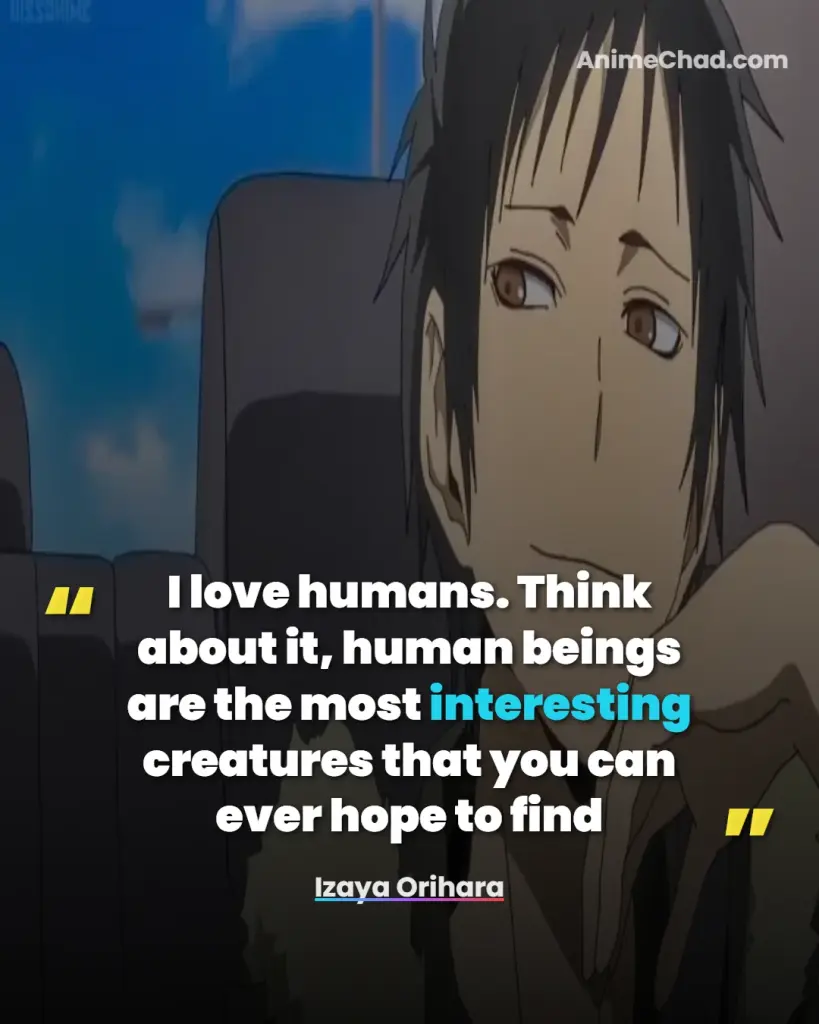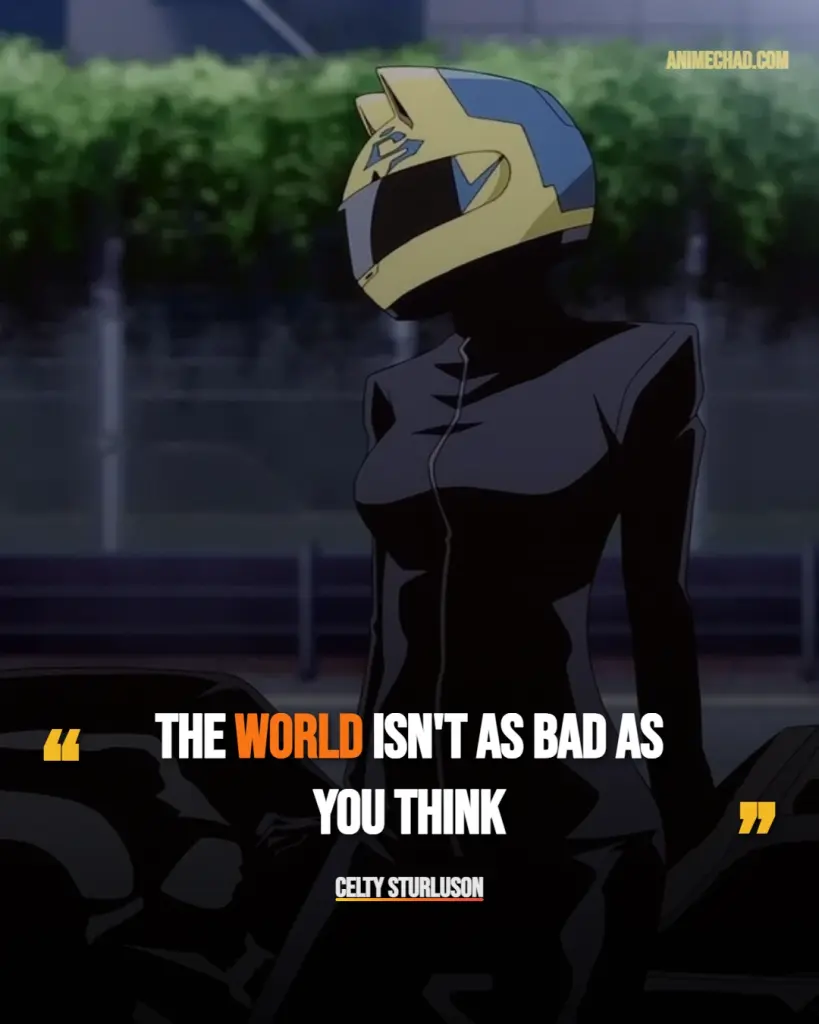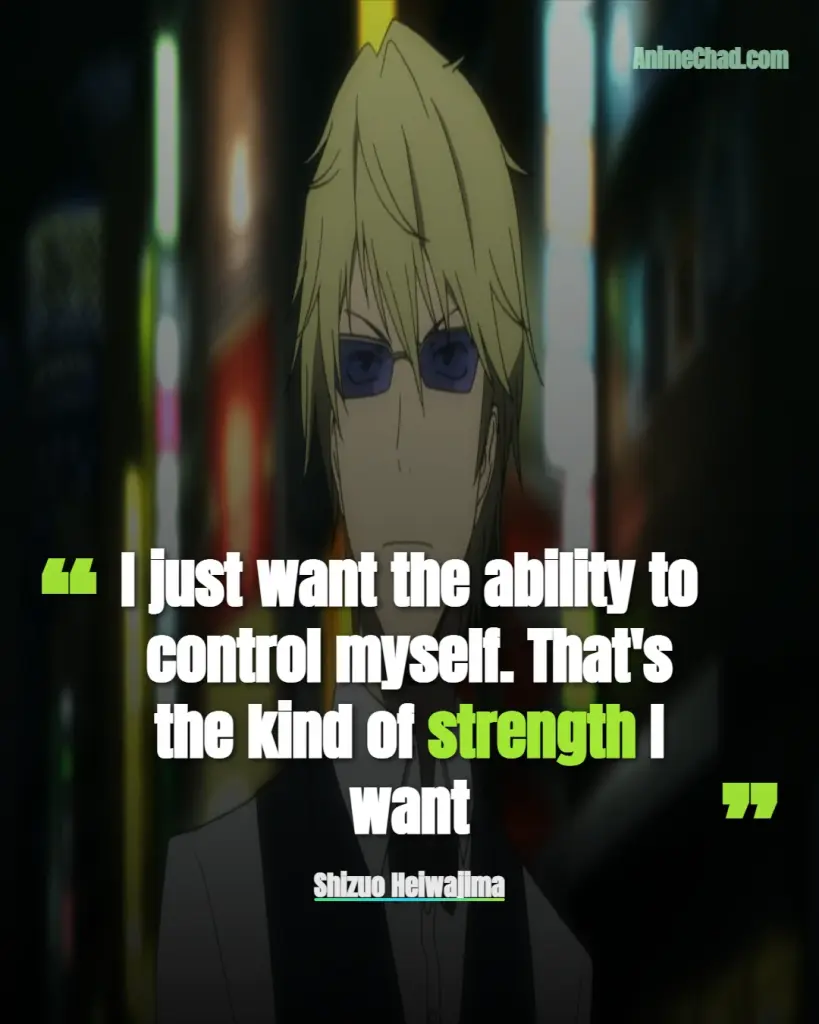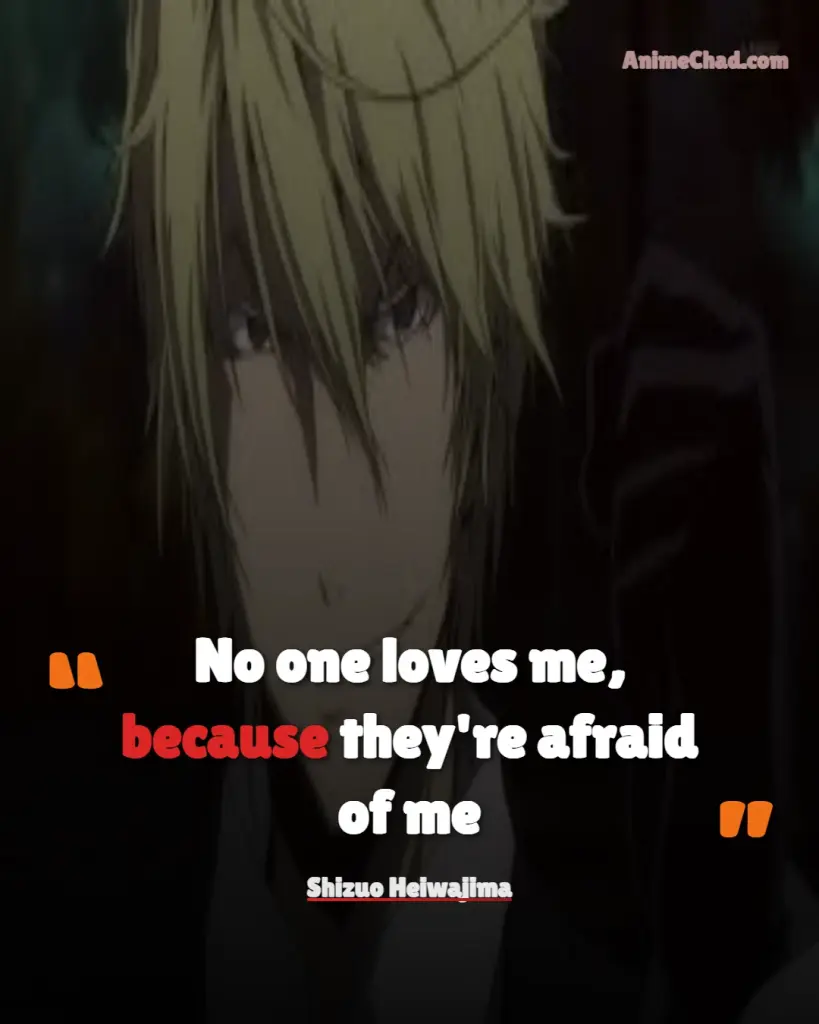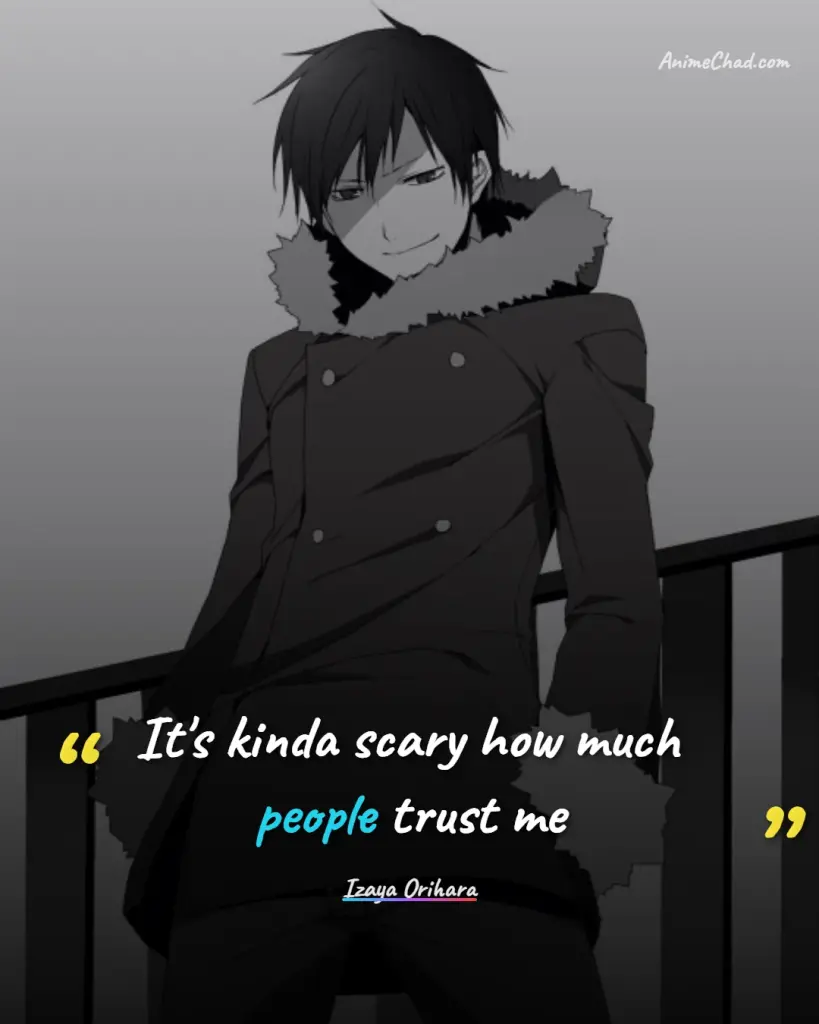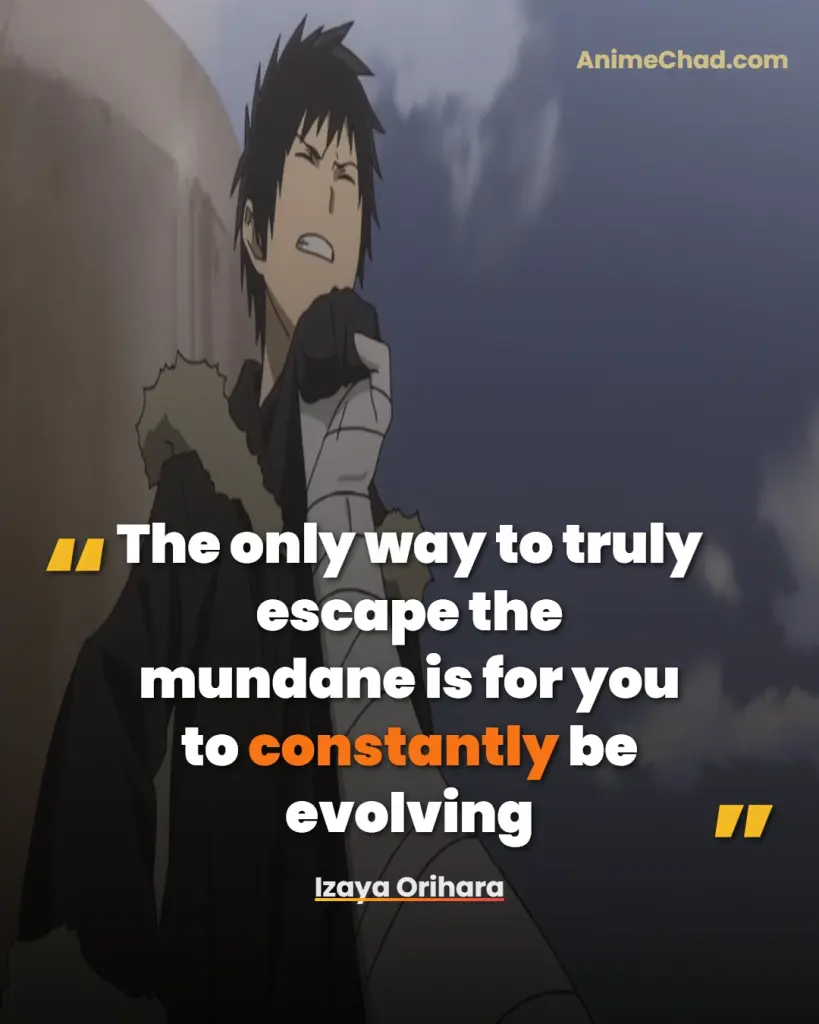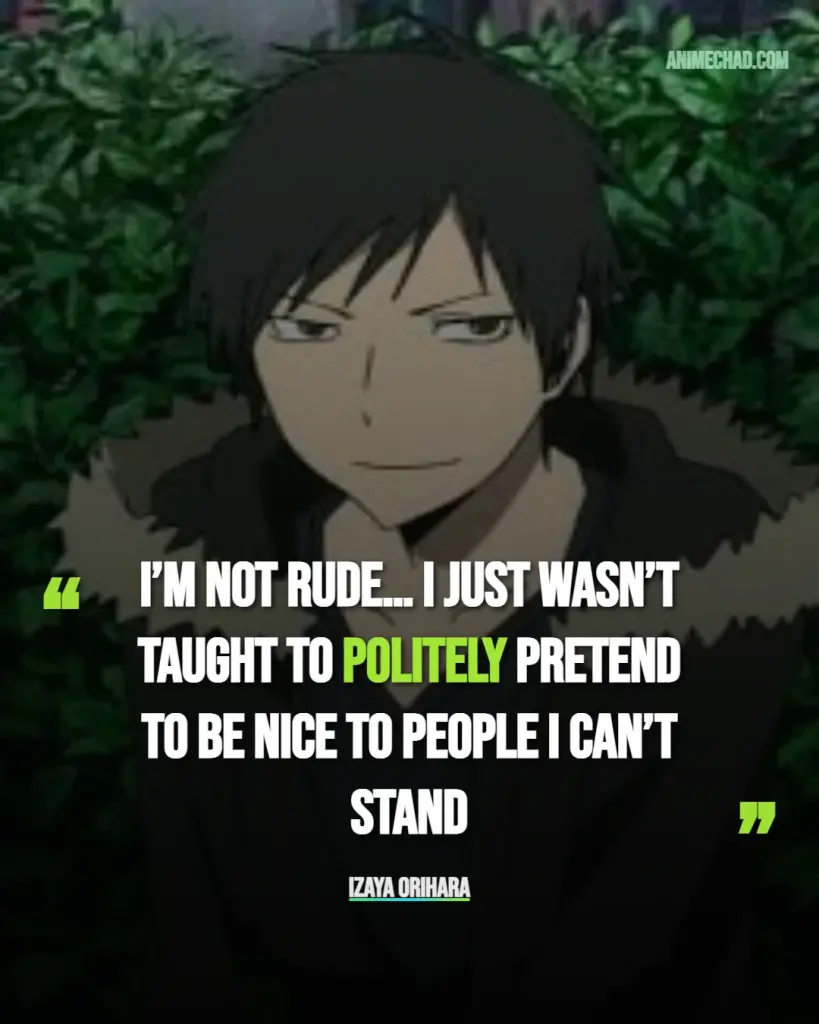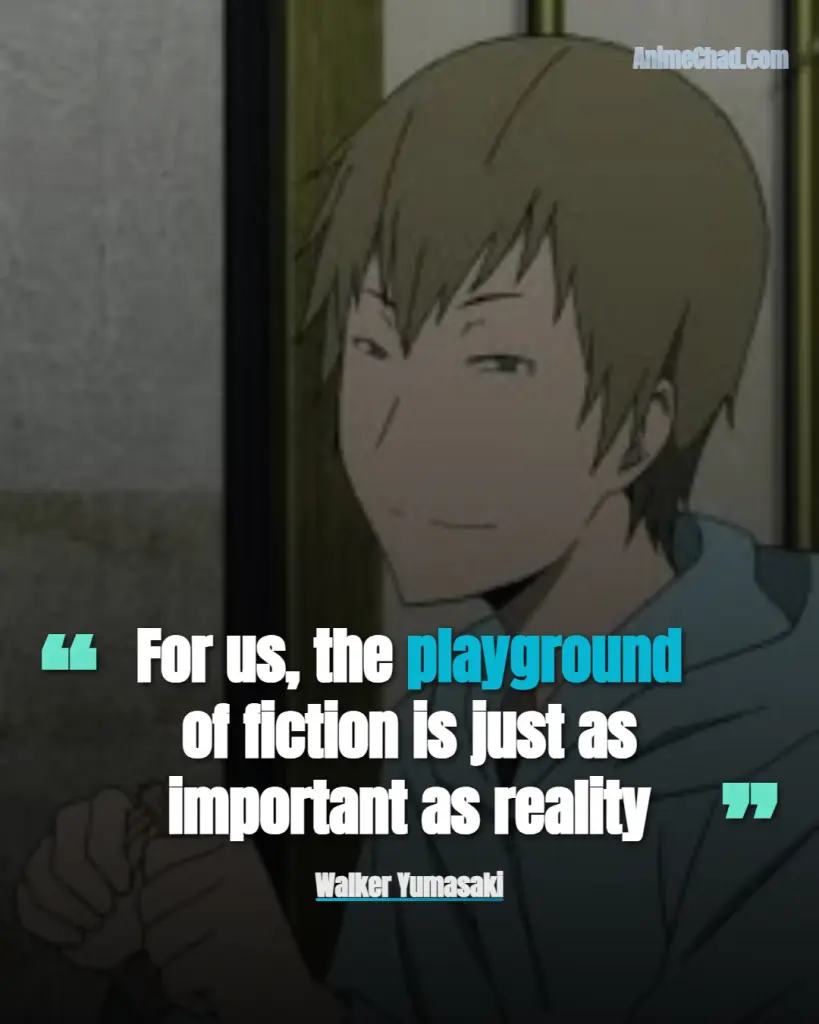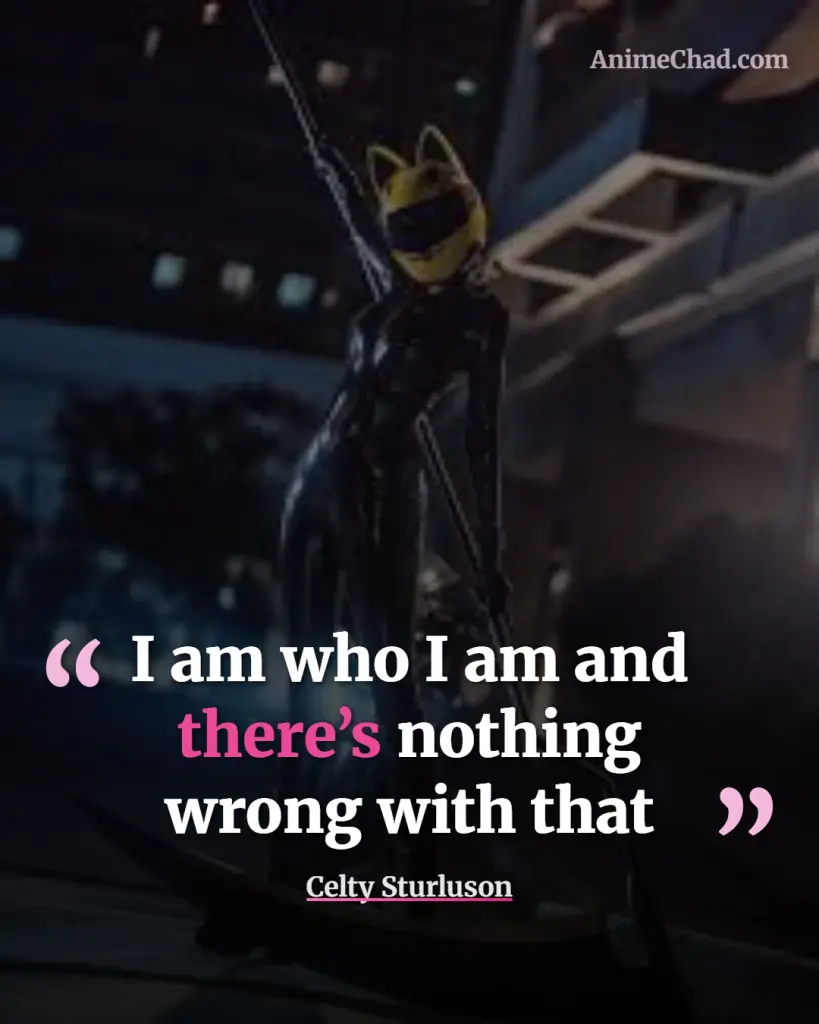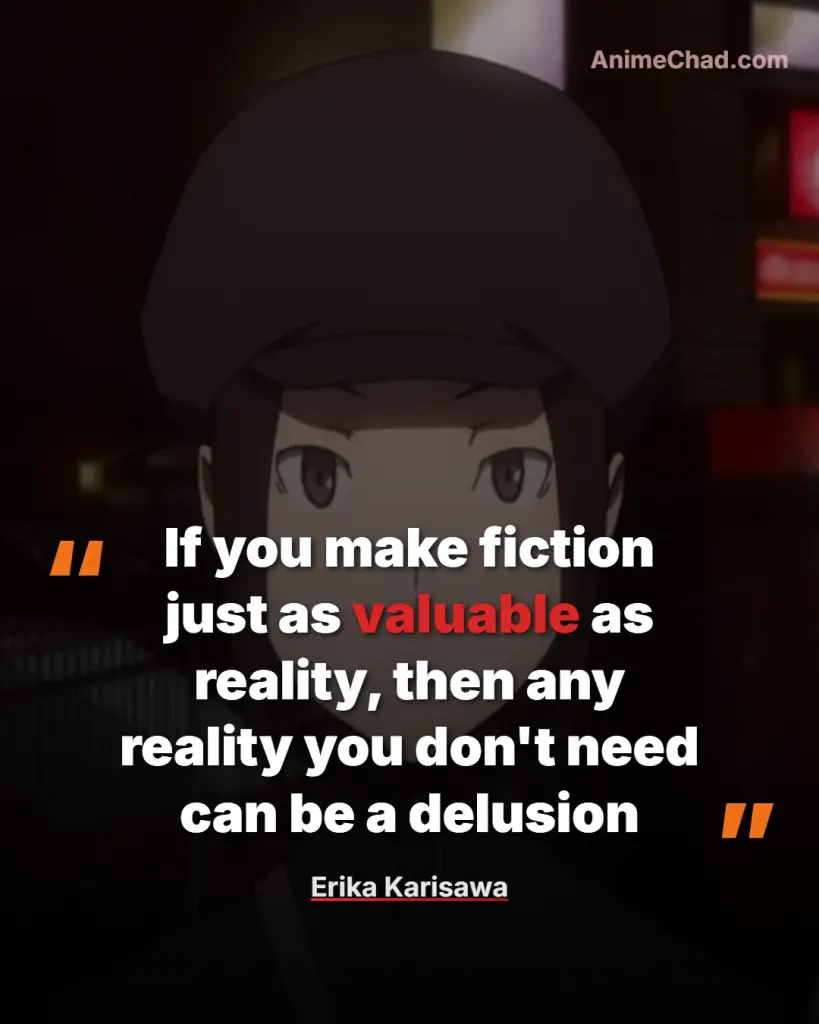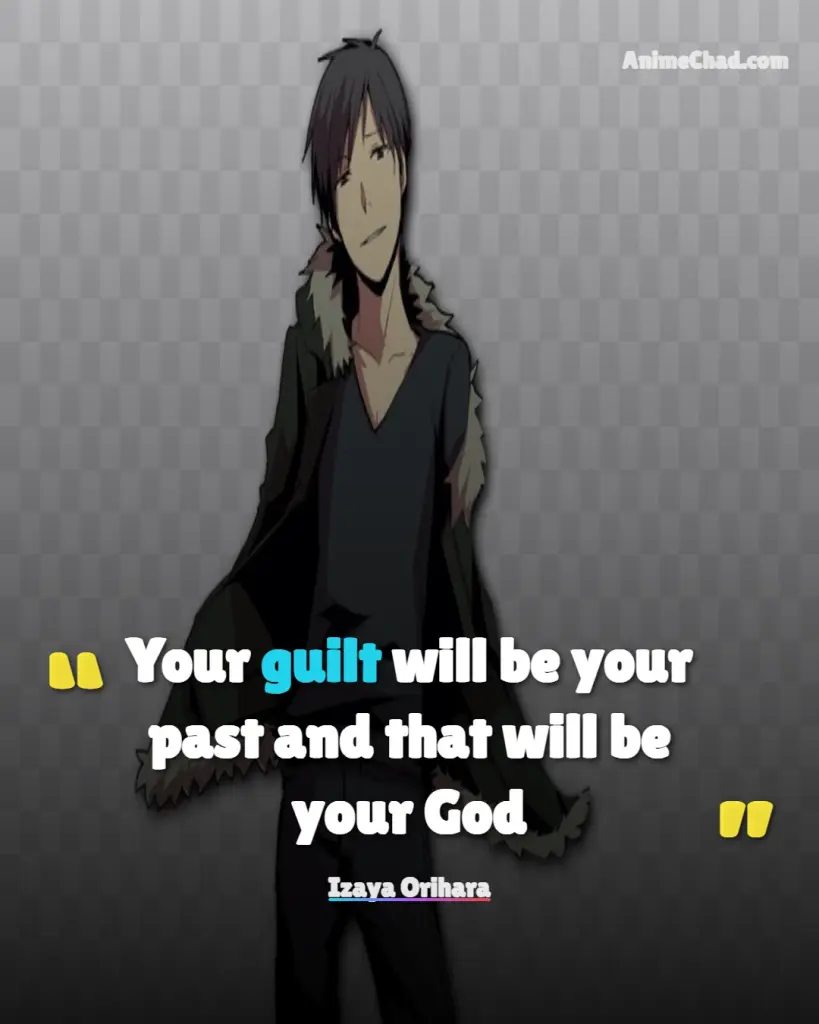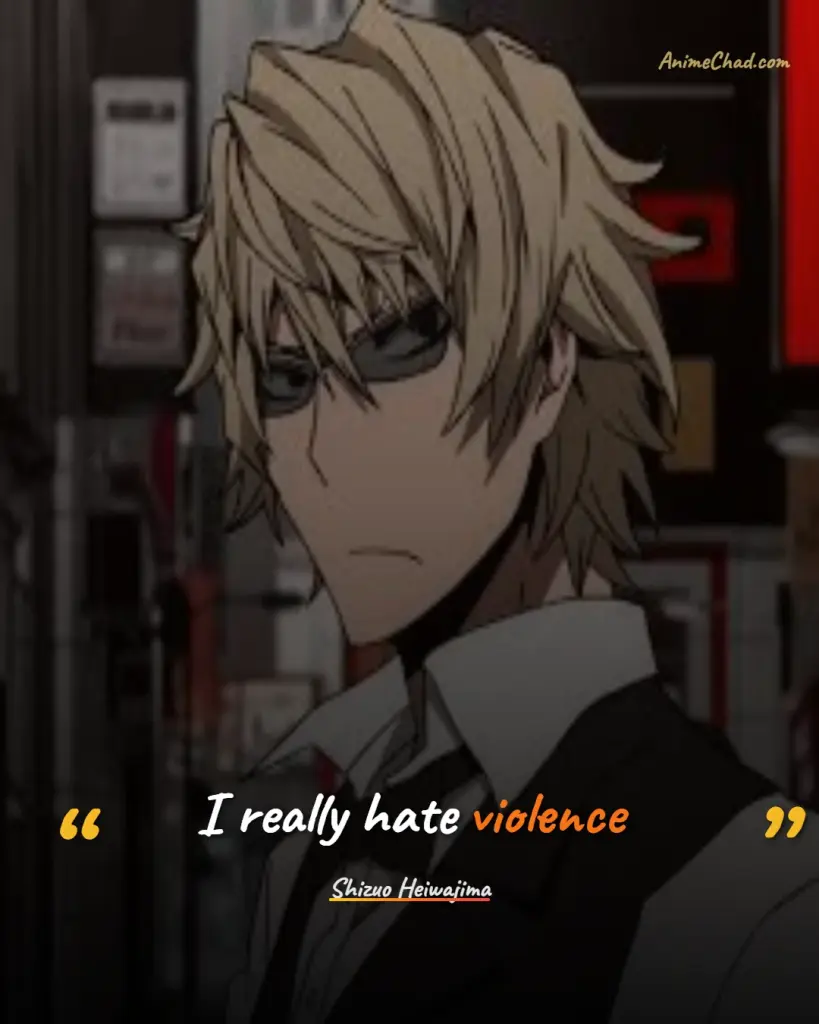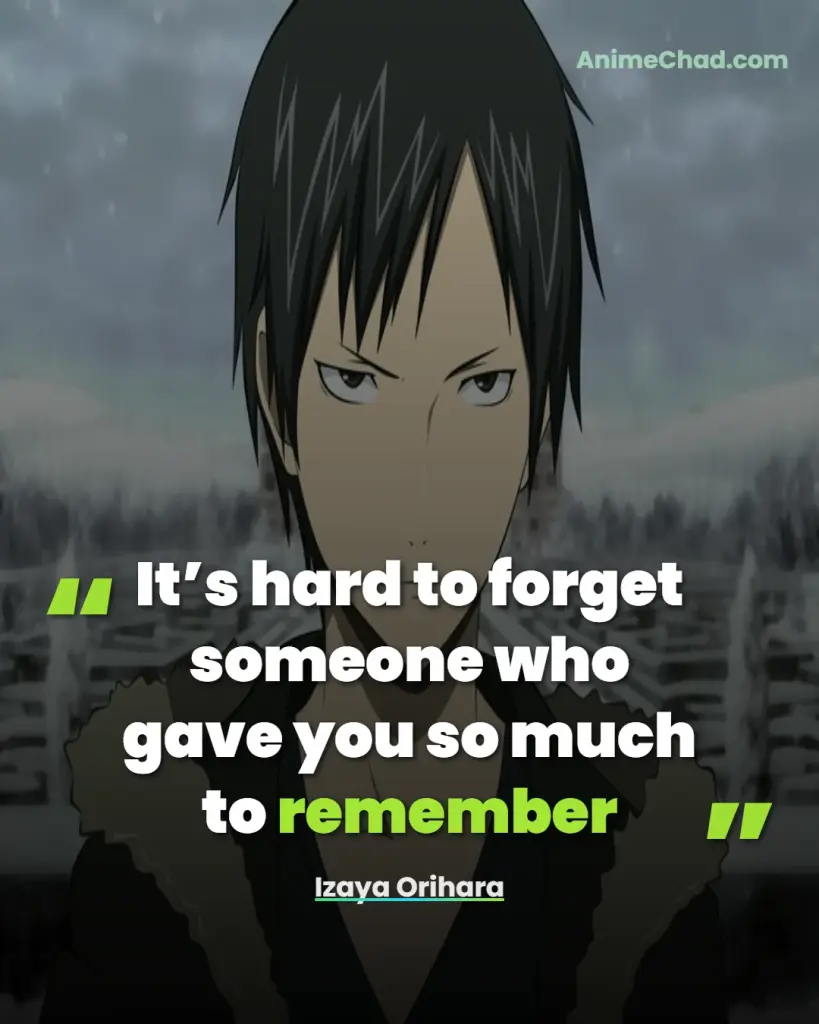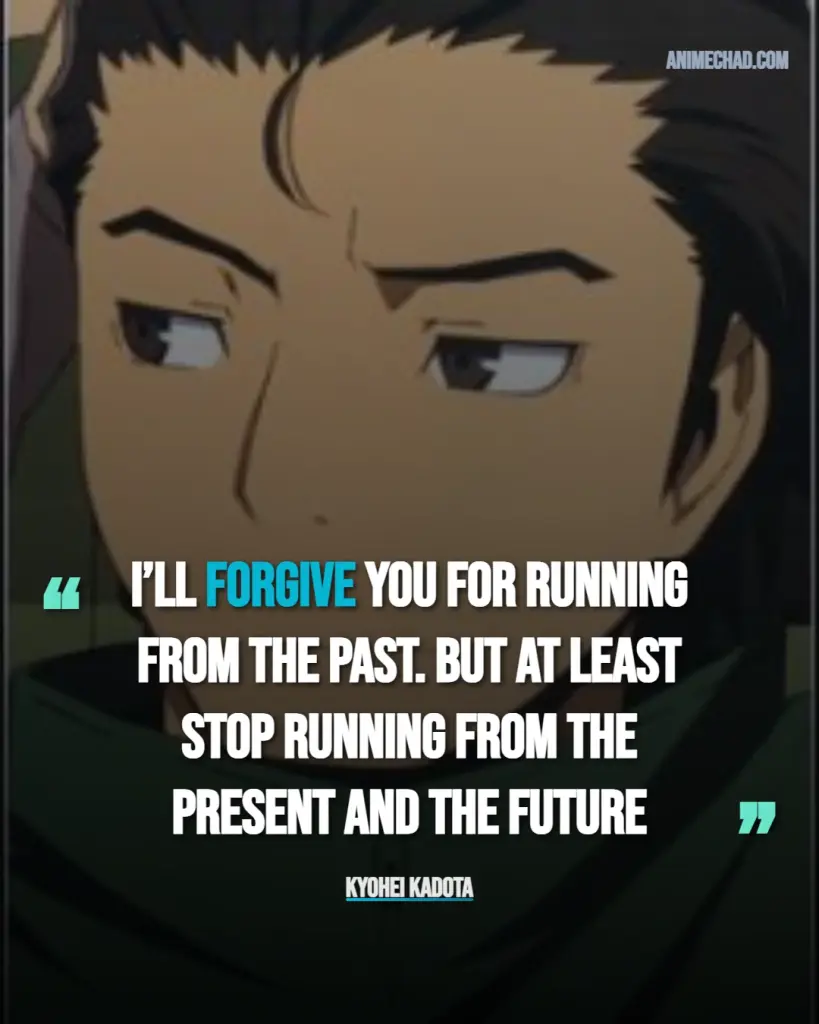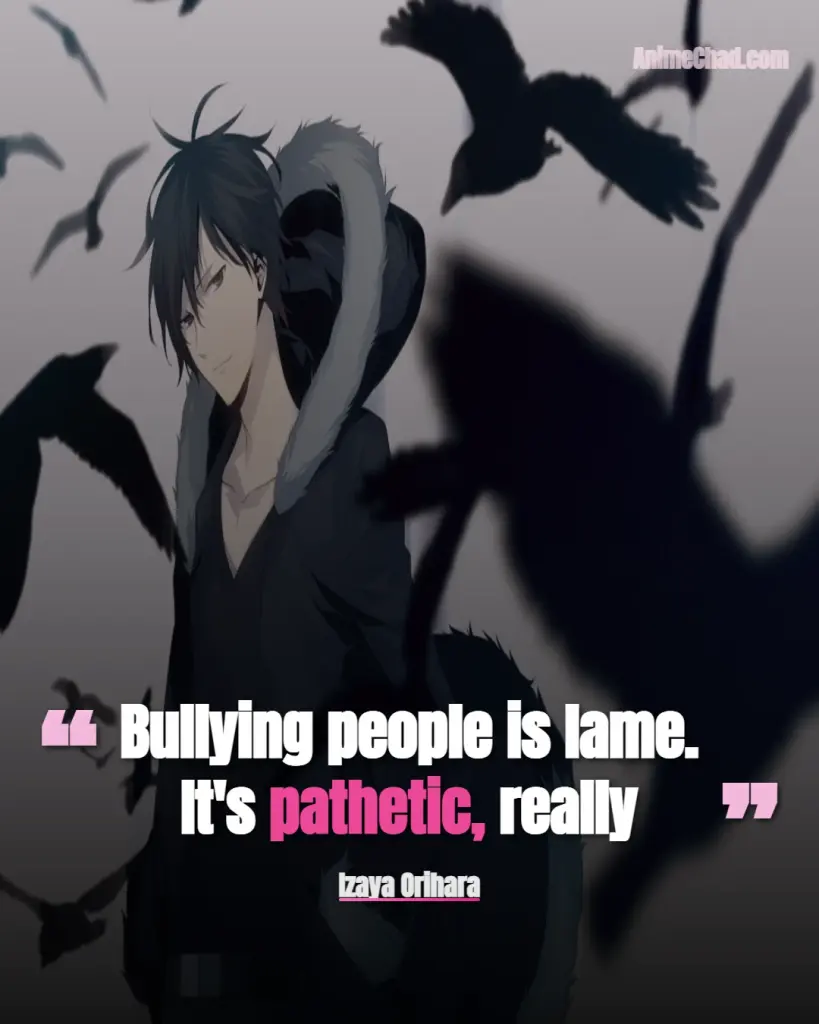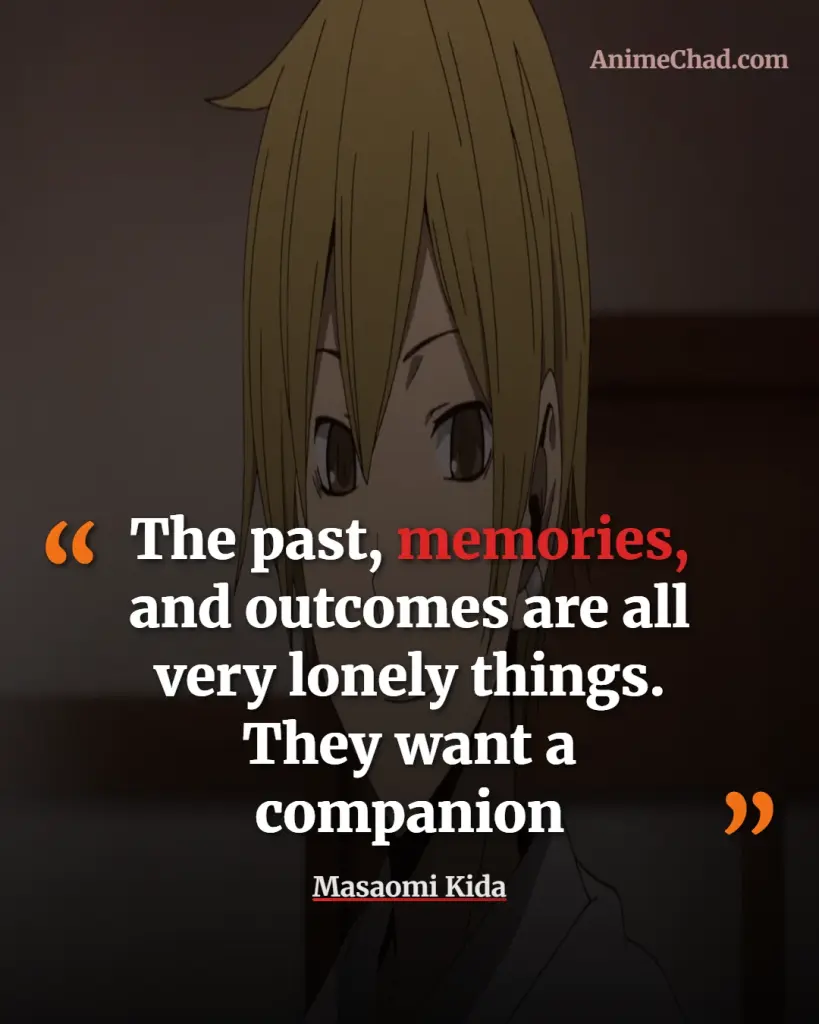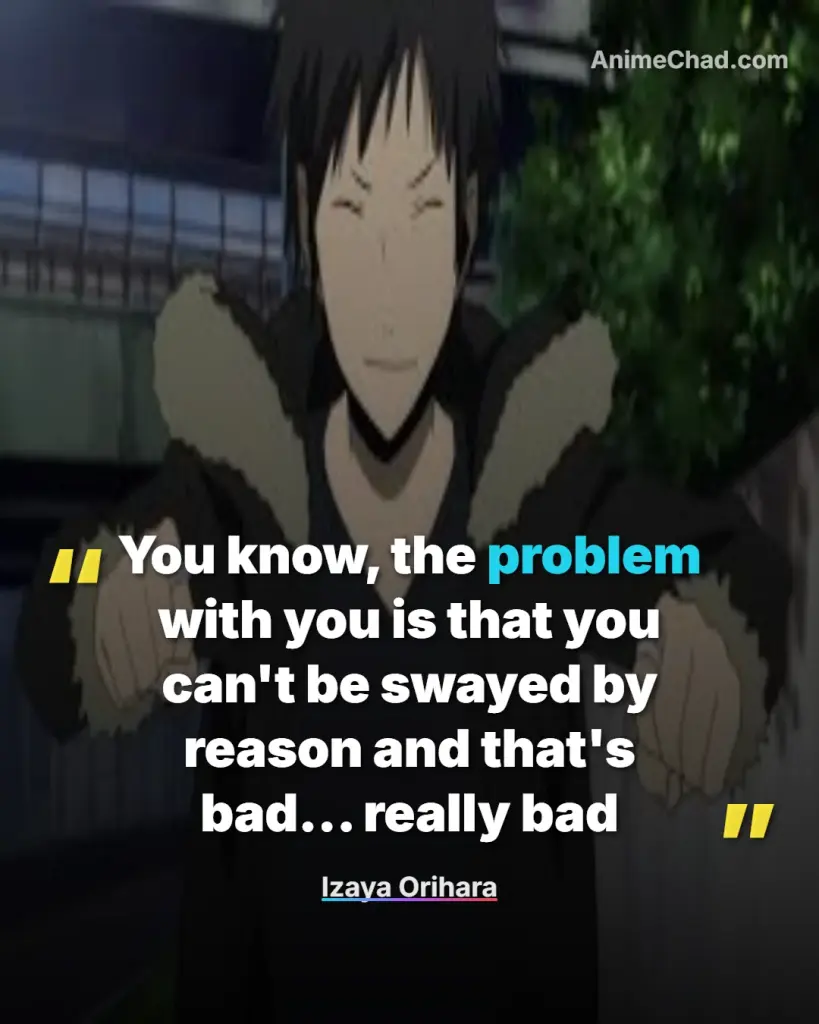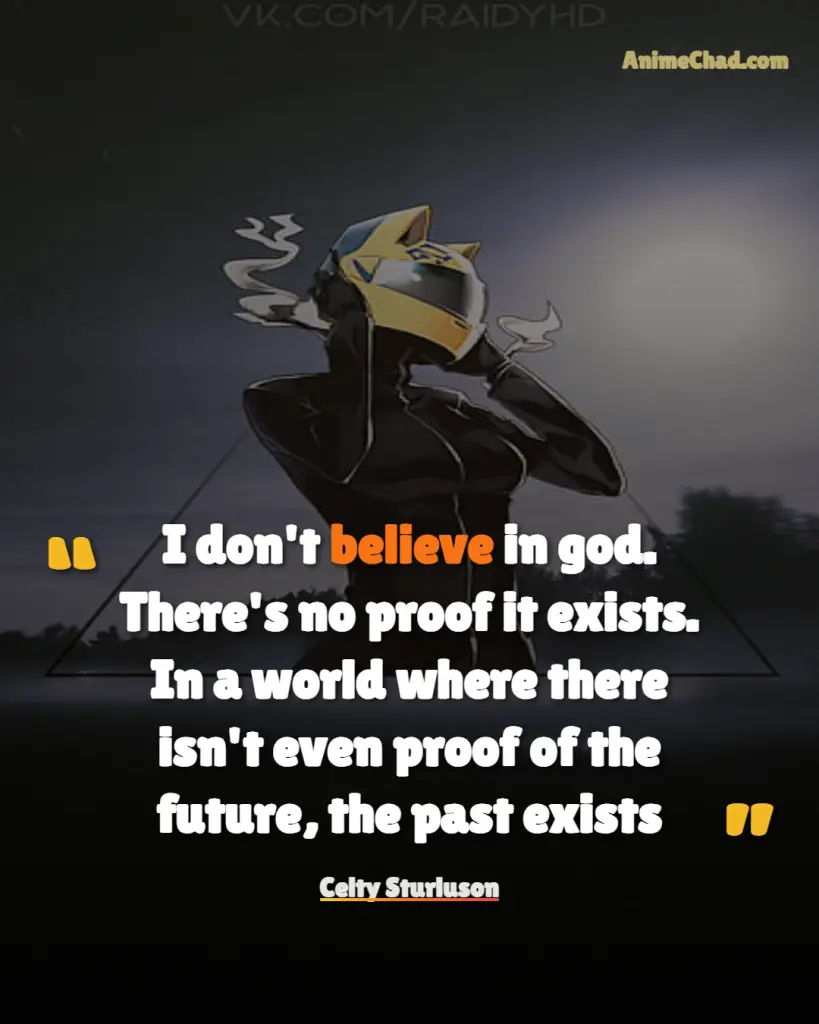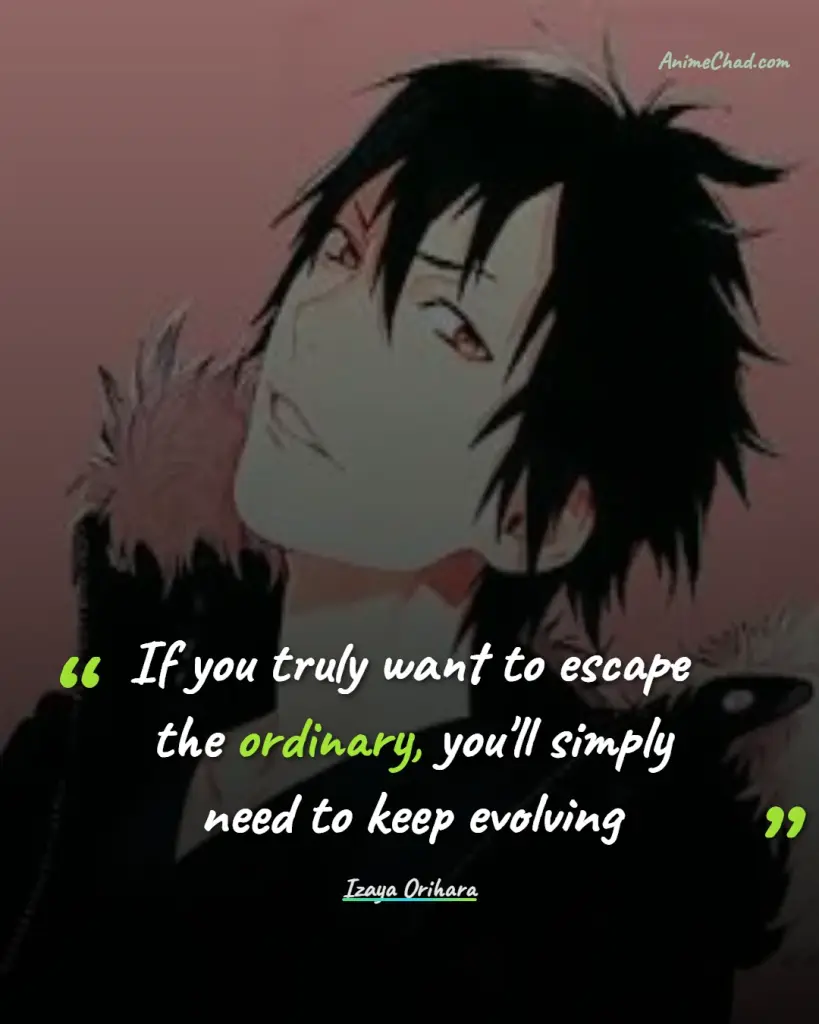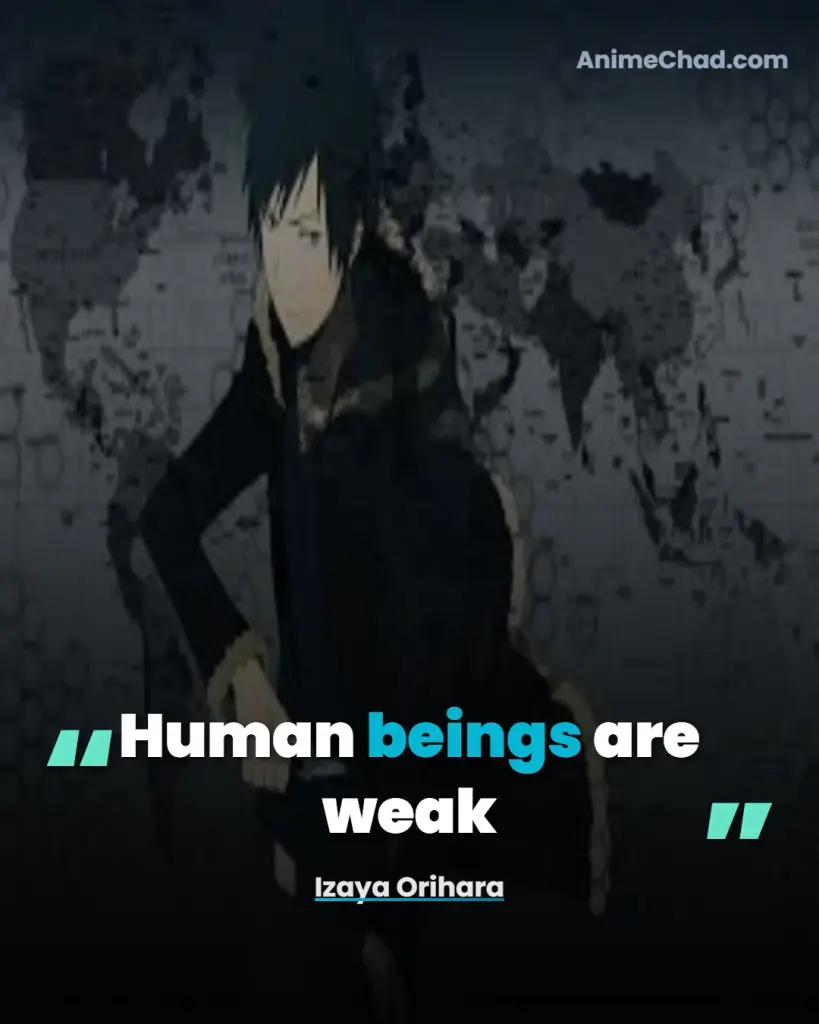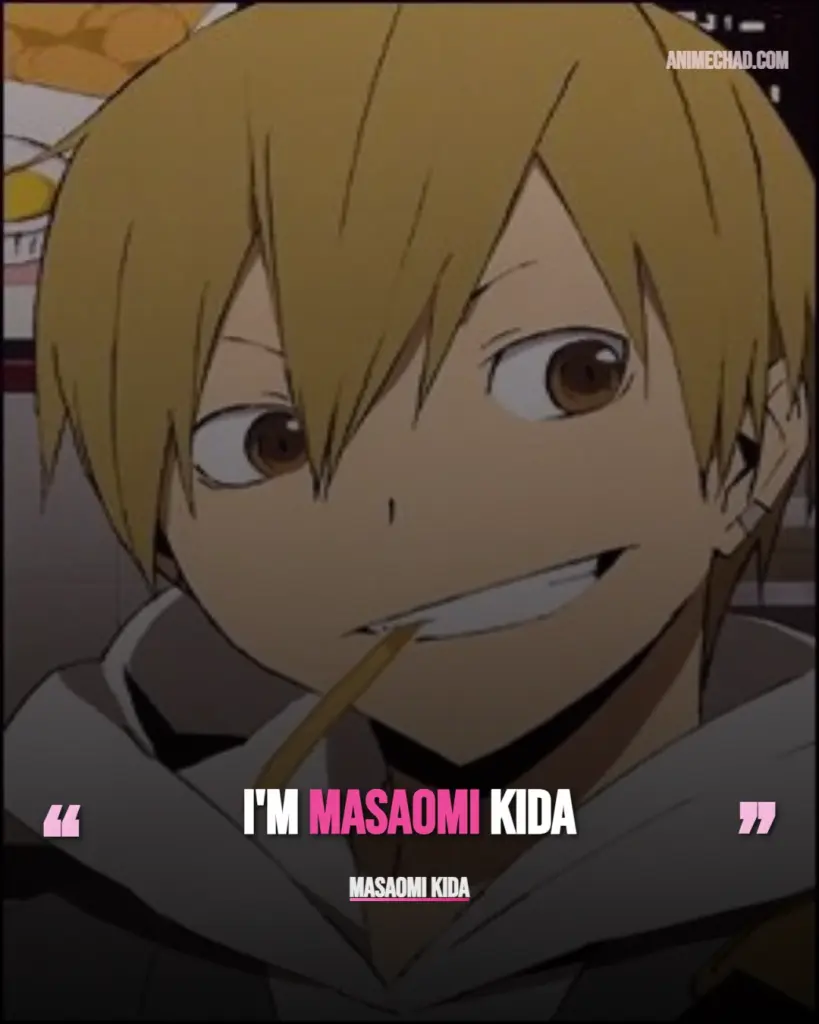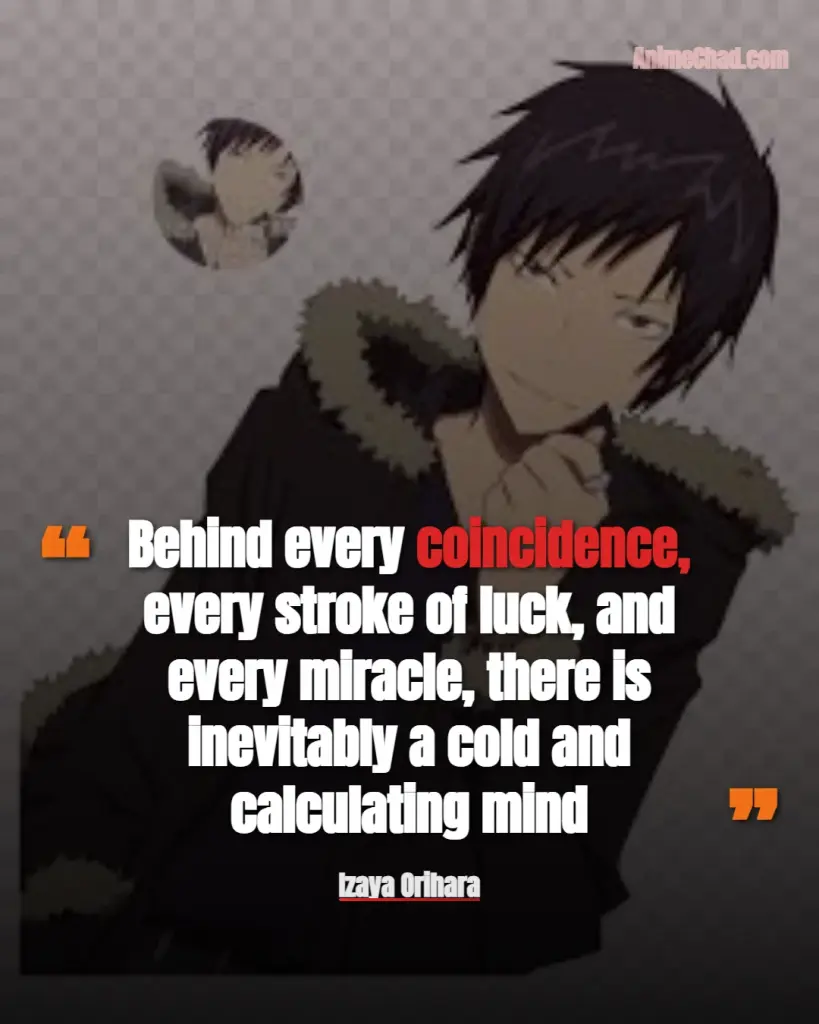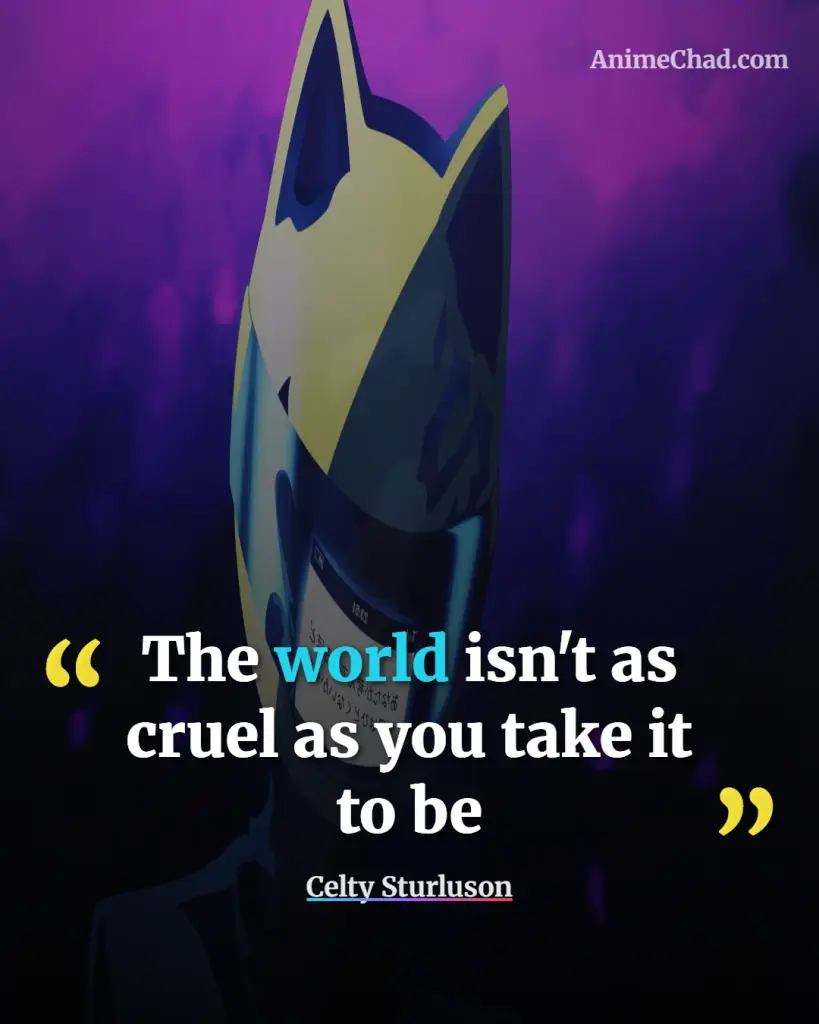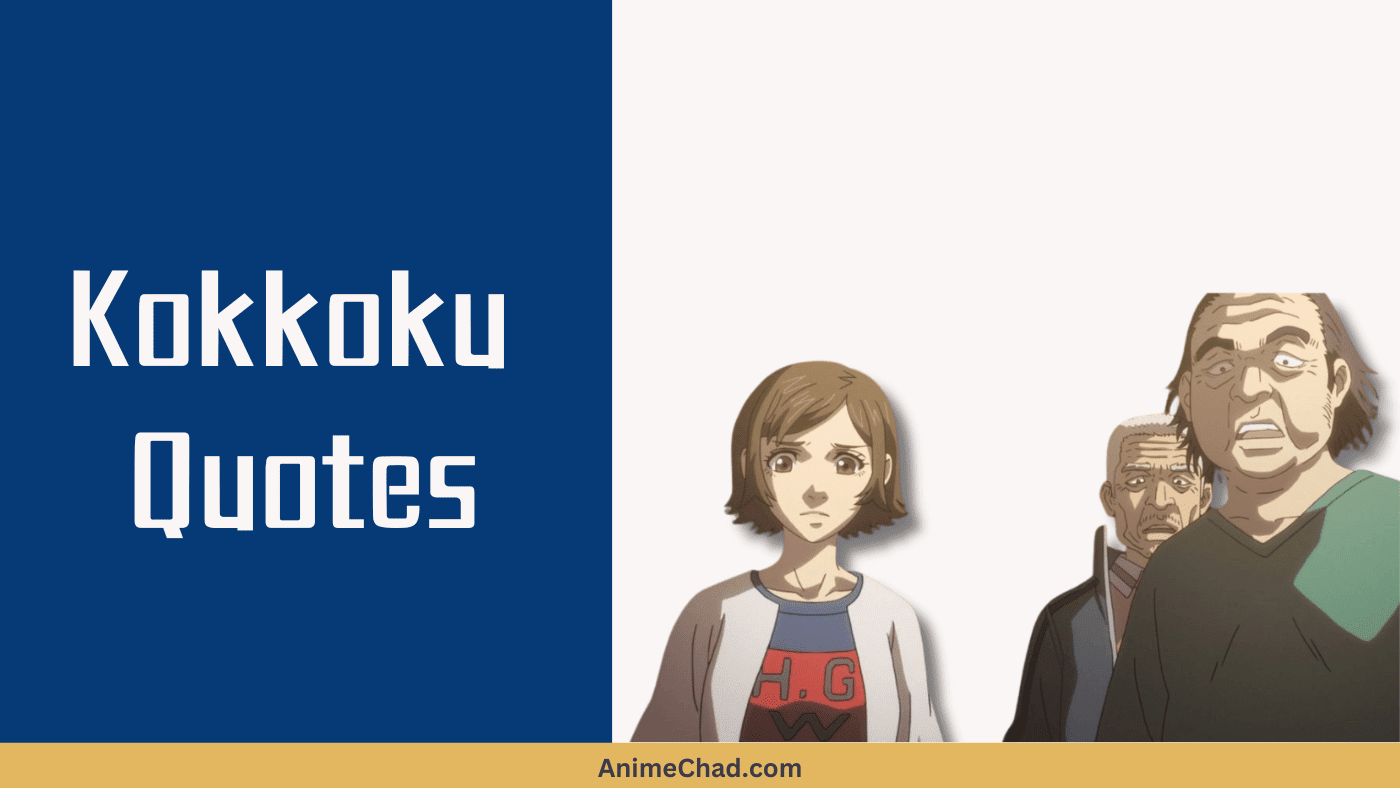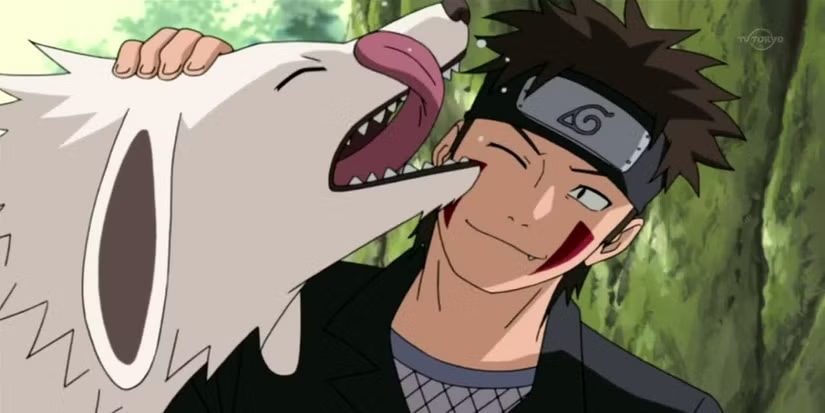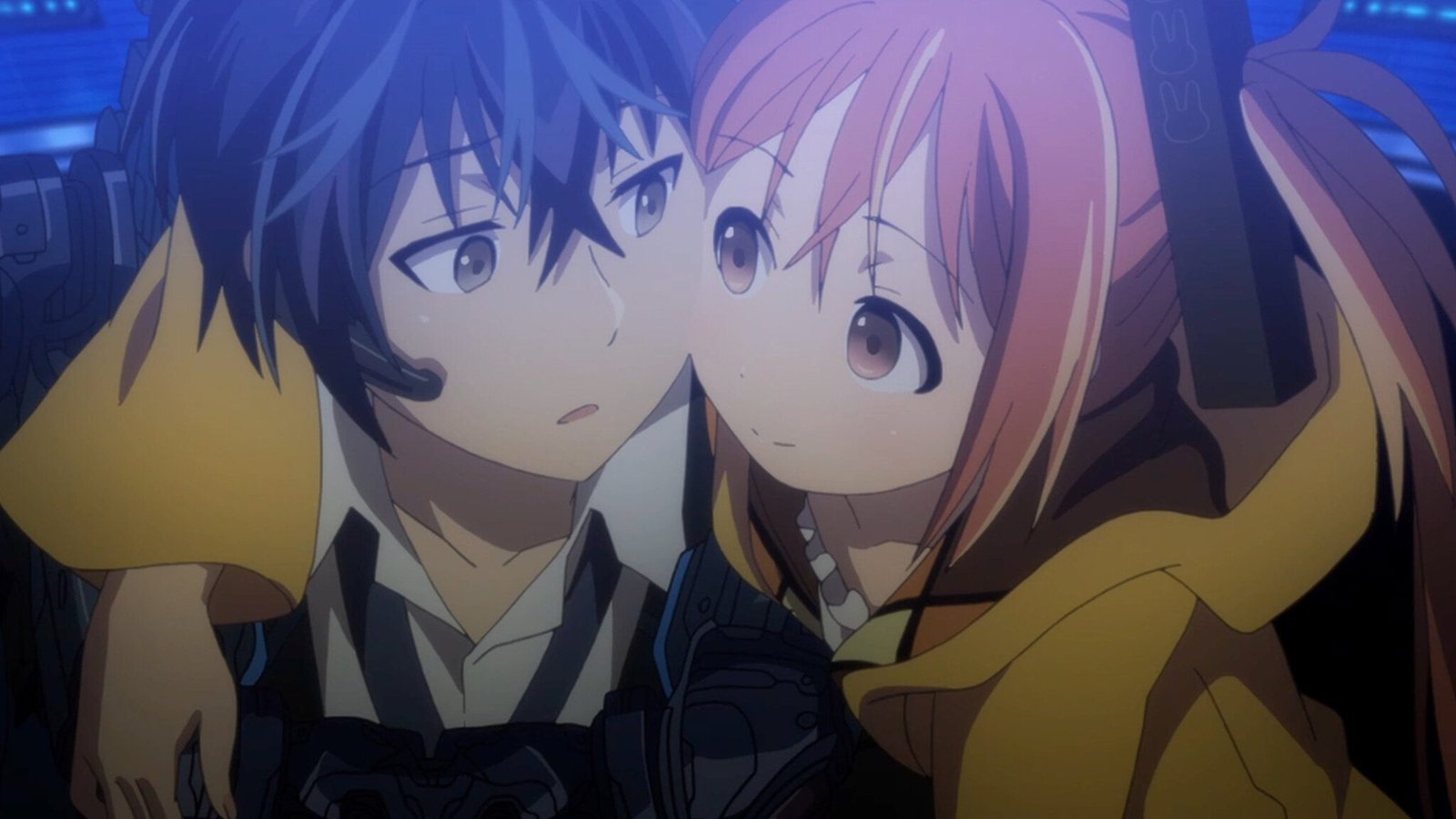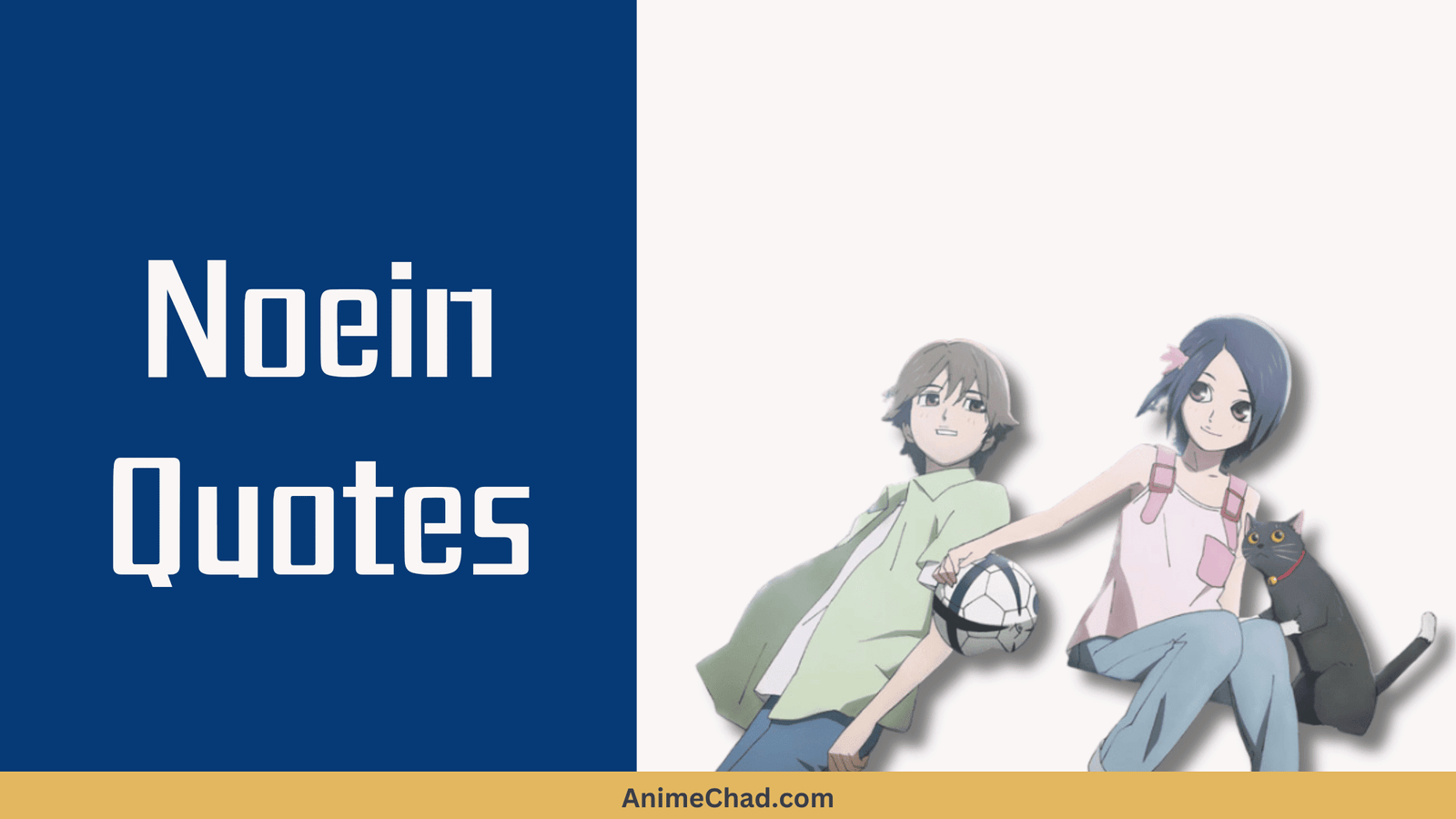Durarara!! centers on Mikado Ryugamine, a high school student who relocates to the chaotic district of Ikebukuro, where urban myths, supernatural beings, and gang rivalries intertwine. The series explores profound themes like the complexity of human nature, the blurred lines between reality and delusion, and the search for identity amid violence and connection.
This curated collection of 25 quotes highlights pivotal moments that underscore character growth, emotional depth, and the show’s broader commentary on life’s unpredictability.
I love humans. Think about it, human beings are the most interesting creatures that you can ever hope to find
Episode 2 (Highly Unpredictable)
Izaya Orihara
Reveals Izaya’s twisted fascination with people, driving his manipulative antics and tying into themes of human observation; emotionally manipulative, sparking his chaotic development.
The world isn’t as bad as you think
Episode 25 (World at Peace)
Celty Sturluson
Celty’s reassuring words to Mikado emphasize hope amid chaos, reflecting her growth from isolation to empathy; peaceful closure, connecting to themes of redemption.
I just want the ability to control myself. That’s the kind of strength I want
Episode 7 (A Sudden Turn)
Shizuo Heiwajima
Highlights Shizuo’s internal struggle with rage, marking his desire for self-mastery; emotionally raw, advancing his arc from destructive force to introspective guardian.
You can run from your past all you want, but it will always follow you
Episode 20 (A New King Will Arise)
Izaya Orihara
Taunts Masaomi about regrets, underscoring inescapable history; intense emotional weight, linking to themes of consequence and Masaomi’s reluctant leadership growth.
If you really do love her, don’t look away, no matter what happens
Episode 21 (Everything Covered in Fog)
Seiji Yagiri
Advice to Mikado on devotion, revealing Seiji’s obsessive yet insightful side; tender moment, tying into love’s endurance and Mikado’s maturing relationships.
No one loves me, because they’re afraid of me
Episode 3 (Rampant Evil)
Shizuo Heiwajima
Exposes Shizuo’s loneliness beneath his strength, a peaceful reflection amid violence; poignant isolation, fostering his bond with Celty and theme of misunderstood power.
It’s kinda scary how much people trust me
Episode 12 (Adoration and Exasperation)
Izaya Orihara
Izaya’s self-aware quip on manipulation, highlighting his god-complex; sly emotional detachment, advancing his arc as Ikebukuro’s puppet master.
The only way to truly escape the mundane is for you to constantly be evolving
Episode 4 (Utterly Alone)
Izaya Orihara
Philosophizes on growth, inspiring Mikado’s Dollars involvement; motivational yet dark, connecting to personal evolution and urban life’s relentless change.
I’m not rude… I just wasn’t taught to politely pretend to be nice to people I can’t stand
Episode 9 (Love and Cherish)
Izaya Orihara
Defends his bluntness, revealing his disdain for facades; humorous yet biting, emphasizing authenticity themes and his unchanging provocative nature.
For us, the playground of fiction is just as important as reality
Episode 18 (Out of Your Control)
Walker Yumasaki
Blurs lines between real and imagined during gang talks; lighthearted escape, tying to delusion themes and Walker’s otaku-driven character stability.
I am who I am and there’s nothing wrong with that
Episode 24 (Selfless Devotion)
Celty Sturluson
Affirms self-acceptance after head recovery quest; empowering peace, marking her development from headless wanderer to confident entity.
If you make fiction just as valuable as reality, then any reality you don’t need can be a delusion
Episode 20 (A New King Will Arise)
Erika Karisawa
Advises Masaomi on coping with trauma; philosophical comfort, linking to illusion themes and her supportive role in group dynamics.
Your guilt will be your past and that will be your God
Episode 11 (Storm and Stress)
Izaya Orihara
Warns of lingering remorse, intensifying psychological tension; heavy emotional burden, highlighting guilt’s role in character redemption arcs.
I really hate violence
Episode 3 (Rampant Evil)
Shizuo Heiwajima
Ironically stated during a rampage, exposing his conflicted soul; explosive battle moment, driving his quest for control and anti-violence theme.
It’s hard to forget someone who gave you so much to remember
Episode 21 (Everything Covered in Fog)
Izaya Orihara
Reflects on lost connections, adding depth to his humanity; melancholic introspection, connecting to memory themes and subtle vulnerability.
I’ll forgive you for running from the past. But at least stop running from the present and the future
Episode 18 (Out of Your Control)
Kyohei Kadota
Guides Masaomi toward accountability; supportive yet firm, fostering his growth from cowardice to responsibility in friendship themes.
Bullying people is lame. It’s pathetic, really
Episode 2 (Highly Unpredictable)
Izaya Orihara
Dismisses cruelty casually, masking his own schemes; ironic detachment, tying to human flaw themes and his unchanging cunning.
The past, memories, and outcomes are all very lonely things. They want a companion
Episode 20 (A New King Will Arise)
Masaomi Kida
Poetic take on history’s persistence; emotional vulnerability, advancing Masaomi’s arc from playful leader to burdened figure.
You know, the problem with you is that you can’t be swayed by reason and that’s bad… really bad
Episode 16 (Mutual Love)
Izaya Orihara
Taunts Shizuo in confrontation, escalating rivalry; tense battle exchange, highlighting irrationality themes and their eternal conflict.
I don’t believe in god. There’s no proof it exists. In a world where there isn’t even proof of the future, the past exists
Episode 24 (Selfless Devotion)
Celty Sturluson
Questions existence philosophically; serene doubt, tying to supernatural identity themes and her acceptance of the unknown.
If you truly want to escape the ordinary, you’ll simply need to keep evolving
Episode 4 (Utterly Alone)
Izaya Orihara
Encourages adaptation amid city chaos; inspirational edge, linking to evolution themes and Mikado’s transformative journey.
Human beings are weak
Episode 12 (Adoration and Exasperation)
Izaya Orihara
Observes frailty to justify meddling; cold analysis, emphasizing vulnerability themes and his god-like detachment from humanity.
I’m Masaomi Kida
Episode 20 (A New King Will Arise)
Masaomi Kida
Reclaims identity post-trauma; defiant return, marking leadership growth and themes of self amid gang conflicts.
Behind every coincidence, every stroke of luck, and every miracle, there is inevitably a cold and calculating mind
Episode 11 (Storm and Stress)
Izaya Orihara
Hints at his orchestration of events; sinister revelation, connecting to manipulation themes and his intellectual dominance.
The world isn’t as cruel as you take it to be
Episode 25 (World at Peace)
Celty Sturluson
Offers optimism to close the series; hopeful finale, reflecting her empathetic development and overarching redemption narrative.

